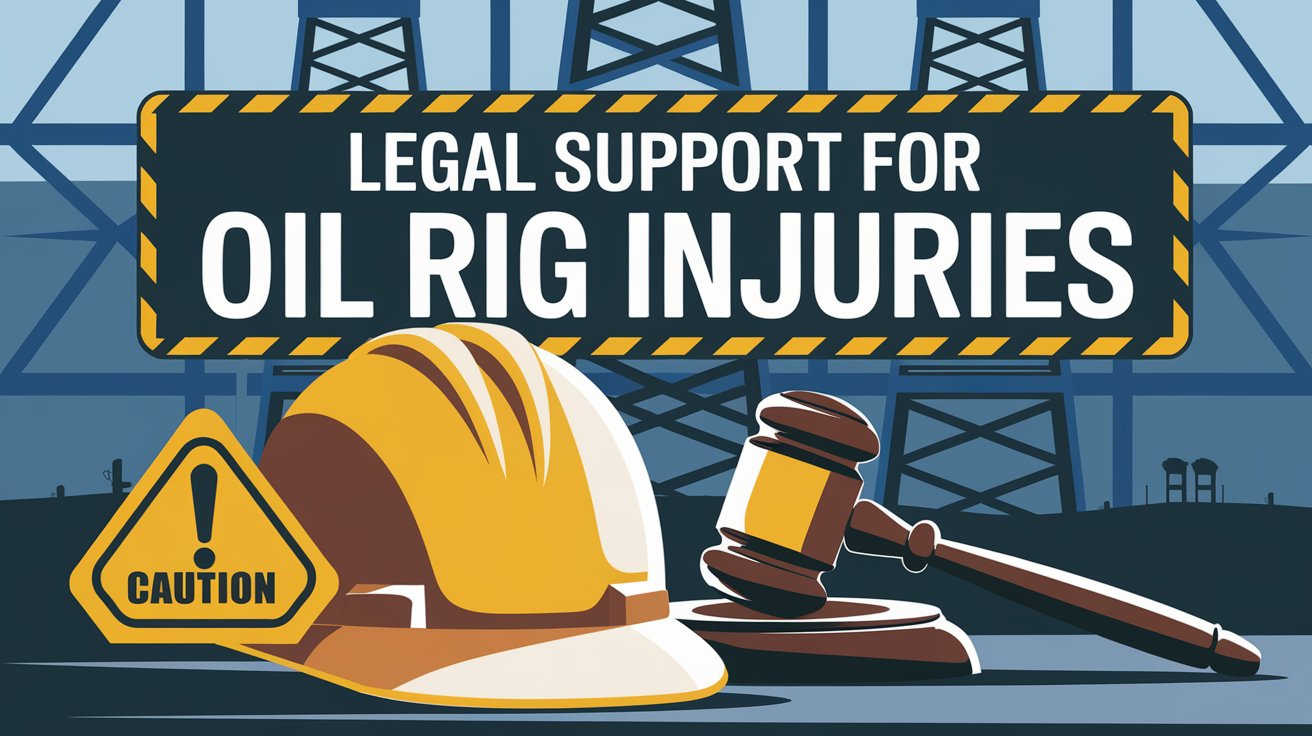Working on an oil rig is one of the most hazardous jobs in the world. The complex machinery, unpredictable weather conditions, and remote locations make oil rig workers more susceptible to accidents than those in most other industries. When such accidents occur, the injuries can be catastrophic, often leaving victims with physical, emotional, and financial burdens. In these cases, hiring an oil rig injury lawyer becomes essential to help navigate the legal process and secure the compensation needed for recovery.
Oil rig injury lawyers specialize in handling cases related to offshore and onshore drilling accidents. Their expertise covers a wide range of areas, including personal injury, maritime law, and workers’ compensation. They are equipped to tackle the unique challenges faced by injured workers, ensuring they receive fair compensation from negligent parties, employers, or insurance companies.
Common Causes of Oil Rig Accidents
Oil rigs are dangerous environments, with accidents occurring due to various factors. Some of the most common causes include equipment malfunctions, human error, fires, explosions, and exposure to toxic chemicals. These incidents often lead to severe injuries, such as burns, broken bones, head trauma, and spinal cord damage.
In some cases, accidents occur because employers fail to maintain safety protocols or provide adequate training. This negligence can make companies liable for damages, which is where oil rig injury lawyers step in to advocate for the injured workers.
Understanding Legal Protections for Oil Rig Workers
Oil rig workers are protected by a unique set of laws, many of which fall under maritime law. Unlike typical workers’ compensation claims, oil rig injury claims may involve complex federal regulations such as the Jones Act and the Longshore and Harbor Workers’ Compensation Act (LHWCA). These laws are designed to offer additional protections to maritime workers, including those working on oil rigs, who face increased risks due to the nature of their jobs.
The Jones Act allows injured maritime workers, including oil rig employees, to sue their employers for negligence. It differs from standard workers’ compensation because it provides greater opportunities for compensation, covering both medical costs and lost wages, as well as pain and suffering. However, navigating these legal complexities can be daunting, which is why having an experienced oil rig injury lawyer is critical.
Investigating the Accident
One of the key roles of an oil rig injury lawyer is conducting a thorough investigation into the accident. Oil rig accidents are often complicated, involving multiple parties such as contractors, equipment manufacturers, and employers. A detailed investigation is crucial to establish the cause of the accident and determine liability.
Lawyers typically collaborate with experts, such as accident reconstruction specialists, engineers, and medical professionals, to gather evidence and build a strong case. They may examine the following factors:
- Safety Violations: Lawyers will investigate whether the employer followed federal and state safety regulations. This includes ensuring that the oil rig was compliant with safety protocols, that equipment was properly maintained, and that employees were adequately trained.
- Equipment Malfunction: Many oil rig accidents occur due to faulty machinery or equipment. If an equipment malfunction caused the accident, the manufacturer or maintenance company may be held responsible. In such cases, the lawyer can pursue claims against third-party manufacturers or suppliers.
- Negligence: Proving employer negligence is central to oil rig injury cases under the Jones Act. This may involve demonstrating that the employer failed to provide a safe working environment, that supervision was inadequate, or that hazardous working conditions were ignored.
The lawyer’s ability to conduct a thorough investigation can make a significant difference in the outcome of the case, ensuring that all liable parties are held accountable.
Navigating Maritime Laws and Regulations
Oil rig workers operate under unique legal frameworks that fall within maritime law. Maritime law, also known as admiralty law, governs offshore activities, including oil drilling. The legal processes and protections for maritime workers are different from those for land-based workers, making it essential to have an attorney who is well-versed in these regulations.
Two major laws that apply to oil rig workers are the Jones Act and the Outer Continental Shelf Lands Act (OCSLA). These laws offer specialized protections for offshore workers, allowing them to seek compensation beyond standard workers’ compensation.
The Jones Act allows injured workers to file claims directly against their employers if negligence can be proven. Under this law, workers can claim damages for medical expenses, lost wages, and pain and suffering, giving them broader compensation rights compared to typical injury claims.
The OCSLA extends protections to workers on oil rigs located on the outer continental shelf of the United States. This law provides workers’ compensation benefits similar to those available under the LHWCA, ensuring that injured workers receive medical care, wage replacement, and rehabilitation services.
An experienced oil rig injury lawyer will understand how to navigate these laws to maximize the compensation available to the victim.
Calculating Fair Compensation
Determining the full extent of compensation for an injured oil rig worker involves considering both immediate and future expenses. Oil rig injuries are often severe and may lead to long-term or permanent disabilities, requiring extensive medical treatment, rehabilitation, and sometimes even career changes.
Compensation can include:
- Medical Expenses: This covers the cost of medical treatment, including emergency care, surgeries, hospital stays, physical therapy, and any necessary long-term care. An oil rig injury lawyer will ensure that all current and future medical expenses are included in the claim.
- Lost Wages: Injured workers are often unable to return to work immediately after an accident, resulting in lost income. In cases of severe injuries that lead to permanent disabilities, workers may be entitled to compensation for lost earning capacity.
- Pain and Suffering: Compensation for pain and suffering accounts for the physical pain, emotional distress, and decreased quality of life caused by the injury. This is a significant factor in oil rig injury cases, as the trauma from a serious accident can have long-lasting effects on a victim’s mental health.
- Disability and Rehabilitation: If the injury results in a permanent disability, workers may require ongoing rehabilitation and assistance. An oil rig injury lawyer will consider these long-term needs when calculating compensation.
The goal of the lawyer is to secure a settlement or court award that covers all aspects of the injury, including physical, emotional, and financial losses.
Negotiating with Insurance Companies and Employers
Dealing with insurance companies after an oil rig accident can be a complex and stressful process. Insurance companies often try to minimize payouts, offering low settlements that do not reflect the full extent of the victim’s damages. Employers may also try to shift blame or deny responsibility, making it even more challenging for injured workers to secure fair compensation.
Oil rig injury lawyers are skilled negotiators who can handle the complexities of dealing with insurance adjusters and employers. They understand the tactics used by these parties to reduce settlement offers and will work to counter these strategies. The lawyer will negotiate on behalf of the injured worker, ensuring that they receive compensation that accurately reflects their injuries and losses.
If the negotiations do not result in a fair settlement, the lawyer can take the case to court, where a judge or jury will determine the compensation.
Representing Victims in Court
In some cases, reaching a fair settlement through negotiation may not be possible. If the insurance company or employer refuses to offer reasonable compensation, an oil rig injury lawyer can represent the victim in court. Going to trial can be intimidating, but having a skilled attorney on your side ensures that your case is presented effectively.
The lawyer will present evidence, call expert witnesses, and make compelling arguments to prove negligence and liability. They will fight for the victim’s right to fair compensation, ensuring that all damages, including medical costs, lost wages, and pain and suffering, are considered.
Conclusion
Oil rig accidents often lead to severe injuries and complex legal battles involving multiple parties, including employers, contractors, and insurance companies. Navigating the legal system alone can be overwhelming for injured workers and their families. This is where the expertise of an oil rig injury lawyer becomes crucial.
Oil rig injury lawyers have the knowledge and experience needed to investigate accidents, determine liability, and calculate fair compensation for victims. They understand the intricacies of maritime law and other regulations that apply to offshore and onshore drilling accidents. By handling the legal complexities, these attorneys allow injured workers to focus on their recovery while ensuring that they receive the compensation they deserve.
From negotiating with insurance companies to representing clients in court, oil rig injury lawyers play a vital role in helping victims rebuild their lives after devastating accidents. By hiring a qualified attorney, injured oil rig workers can have confidence that their rights will be protected and that they will receive the full compensation they are entitled to.





